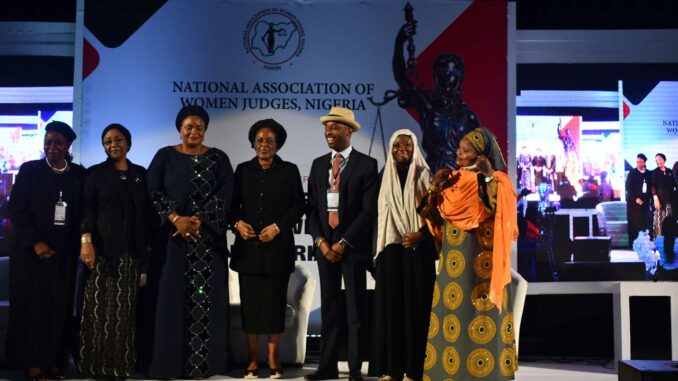
The Vice President, Prof. Yemi Osinbajo (SAN), has charged the National Association of Women Judges to provide practical and meaningful ideas that would facilitate justice delivery without compromising the well being of vulnerable witnesses.
According to him, such protection must not only address the overwhelming cultural and social norms which constitute barriers to exposing criminals, but must address problems that witnesses face before, during and after trial.
He stated this in a goodwill message delivered on his behalf by his Senior Special Adviser on Research, Legal and Compliance matters, Prof. Bulkisu Saidu at “the Hybrid Virtual Conference on “Protection of Child & Vulnerable witnesses in Nigeria”.
His words: “At all times, the protection of their privacy and their identities should be paramount. It is not enough to pass laws for the protection of the child and other vulnerable witnesses, there is the need to have in place clear implementation and enforcement mechanisms aimed at actualising the intendment of the law.”
Prof. Osinbajo also stressed the need for appropriate protective measures for children, saying that the prevalence of sexual and gender-based offences against children has further brought to the fore the imperative of designing appropriate protective measures for children, who are sometimes the only witnesses to offences.
The President of the National Association of Women Judges, Nigeria, Justice Mary Ukaego-Odili, stated that the association had advocated the protection of children and vulnerable witnesses, noting that no single legislation in the country provides for their protection in incidences of sexual abuses and other related offences.
She further disclosed that the hesitation by some states to domesticate the Child’s Right Act, which has been passed by the National Assembly, has created a gap in offering protection to children and vulnerable witnesses in Nigeria.
Justice Ukaego-Odili said: “The essence of this Hybrid Conference on Child and Vulnerable Witnesses Protection in Nigeria is to create the awareness, stimulate discussions, cross-fertilize ideas and opinions and congregate experiences towards enhancing and charting a new course for child and vulnerable witnesses within the context of the Nigerian legal system.
“The context of this protection for Child and Vulnerable witnesses has become imperative having regard to the indices which has shown that Nigeria is behind in the protection of Child and Vulnerable witnesses when compared to her Commonwealth counterparts.
“It is important to draw the attention of all participants that no single legislation in Nigeria provides for the protection of Child and Vulnerable witnesses in Nigeria. The situation is further compounded by the challenge of defining who is a child under the Nigerian law. The National Assembly has passed the Child’s Right Act, however, some States of the Federation are yet to domesticate this legislation.
This hesitation in domestication has in some ways put a peg in the process of development of practices and systems deliberately aimed at offering protection to child and vulnerable witnesses in Nigeria.”
The First Lady of Nigeria, Mrs. Aisha Buhari, said cases of abuse have skyrocketed due to many factors including insurgency, banditry, and the COVID-19 lockdown.
“For as many of the victims that have found justice, many more have remained traumatized and un-served. Even those who have ventured to speak out have drawn opprobrium and stigma from the community and lack of compassion from the system that is meant to protect them.
“I understand that some of the recorded barriers in delivering justice to victims include unnecessary and long delays in processing cases in the courts, poor questioning practices and hostile physical environment in which the administration of justice takes place. It is my hope that these barriers will be addressed adequately by this conference,” she said.
Minister of Women Affairs, Dame Pauline Tallen, noted that recent surveys reveal that children under the age of 15 years constitute over 40 percent of Nigeria’s population and are considered to be one of the most vulnerable groups.
“A considerable level of effort is therefore required to ensure their survival, development, care and protection. The National Child Rights Implementation Committee is working very hard to coordinate issues of child protection in Nigeria,” she said.
END

Be the first to comment